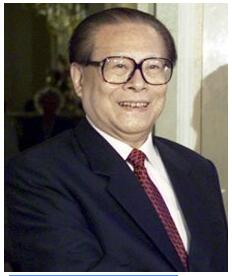Jiang Zemin’s reign
As a result of the events of 1989, there was a temporary revival of state economic mechanisms due to the now overwhelming conservative forces in the government. Deng Xiaoping vehemently opposed these efforts in the spring of 1992 by regaining the economic policy initiative with a propaganda tour known today as the “Journey to the South” for the expansion of economic reforms.
The CCP General Secretary Jiang Zemin, who has been in office since 1990, turned to Deng Xiaoping’s course. Together with the future Prime Minister Zhu Rongji, now he paved the way for China’s “socialist market economy”. The planned economy of the PRC was completely abolished. A new company law from 1994 created a legal basis for the establishment of private companies and the liquidation of insolvent state-owned companies. In 1997, thousands of insolvent state-owned companies were finally dissolved and millions of workers laid off from the hands of the state into the free economy or unemployment. At the same time, high levels of foreign direct investment were directed to China and international trade expanded. According to computerannals, the highlight of this development was joining the WTO in 2001.
When Deng Xiaoping died on February 19, 1997, he left behind an economically prosperous and at the same time politically stagnant China. But while the economy grew by double digits, it was also becoming apparent that the reforms had not only produced winners but also many losers, including China’s farmers and migrant workers.
China under Hu Jintao
In 2002, Hu Jintao was appointed general secretary of the CCP, and Wen Jiabao became prime minister. Although both supported the reform policies, they nonetheless endeavored to mitigate the growing social inequalities that China’s new capitalism had created. Hu Jintao’s concept of a “harmonious society” was the guiding principle.
Instead of advancing elementary structural reforms like their predecessors, however, they switched to fiscal policy cushioning of social hardship. For example, agricultural taxes have been abolished and higher resources have been used to develop rural social and infrastructure systems. However, this did not eliminate the fundamental income differences in the PRC. On the other hand, in the Olympic year 2008 the economic vulnerability of the People’s Republic of China became clear for the first time when exports collapsed as a result of the global economic crisis and the government had to launch rescue packages worth billions.
The Xi Jinping government
Xi Jingping’s first term (2012-2017) was shaped by Xi’s personal consolidation of power and the structural reform of the People’s Liberation Army. In the economic field, however, crucial problems such as over-indebtedness, over-capacities and delayed structural reforms have still not been resolved. China under Xi Jinping continued to move away from political liberalization. Rather, digital information technology is used to build a comprehensive surveillance apparatus.
The most important instrument of Xi Jinping’s power consolidation to this day is the anti-corruption campaign initiated at the beginning of his first term in office, in which not only lower ranks of the party were brought to justice, but also 150 politicians (“tigers”) from the party’s upper ranks. In addition to these personnel consolidation measures, efforts were made to align the party with the person of Xi Jinping. At the end of 2016, the CCP Central Committee published a document calling Xi Jinping the ” core leadership ” of the party. This policy, which is geared towards a strong leader, is reflected in the tendencies towards centralization of the political apparatus. Xi Jinping is personally chairman of many CCP leadership groups, including those as critical as national security, cybersecurity, or military reform.
The reorganization of the People’s Liberation Army carried out by Xi Jinping included not only the rejuvenation and professionalization of the military leadership personnel, but also a centralization of the higher-level organizational structures. This allows the chairman of the CCP’s Central Military Commission, currently Xi Jinping, to have more direct access to the armed forces than before.
At the 19th party congress in October 2017, Xi Jinping was confirmed as party leader. In addition, important management positions were filled. In addition to General Secretary Xi Jinping and Prime Minister Li Keqiang, Li Zhanshu, Wang Yang, Wang Huning, Zhao Leji and Han Zheng were accepted into the Politburo Standing Committee. In addition to key personnel decisions, Xi Jinping’s theory of “socialism with Chinese characteristics in a new era” was incorporated into the party statute. Xi Jinping’s ideas are developed through systematic indoctrination widespread in party, educational institutions and population.
In March 2018, the National People’s Congress decided to lift the constitutional limitation of the President’s term of office to two legislative terms. So it is theoretically possible for Xi Jinping to remain president for life. At the same time, Wang Qishan was appointed Vice President. 69-year-old Wang was responsible for running the anti-corruption campaign during Xi’s first term in office and is one of Xi’s closest confidants. Xi is therefore starting his second term of office with personal power that his two predecessors did not have at their disposal in this form, so that he can continue his centralization measures.
In addition to the military reform, a strengthening and realignment of the internal security organs is also characteristic of Xi’s policy.
The beginning of Xi’s second term also marks the beginning of the second phase of the anti-corruption campaign, which has been extended beyond the party to include the entire public service. The National People’s Congress decided in March 2018 to set up a “National Supervisory Commission”. This has extensive rights. The commission can interrogate suspects and arrest them without them having the right to a lawyer.
